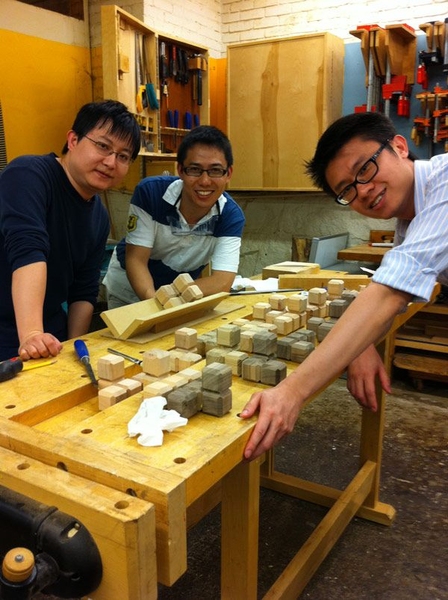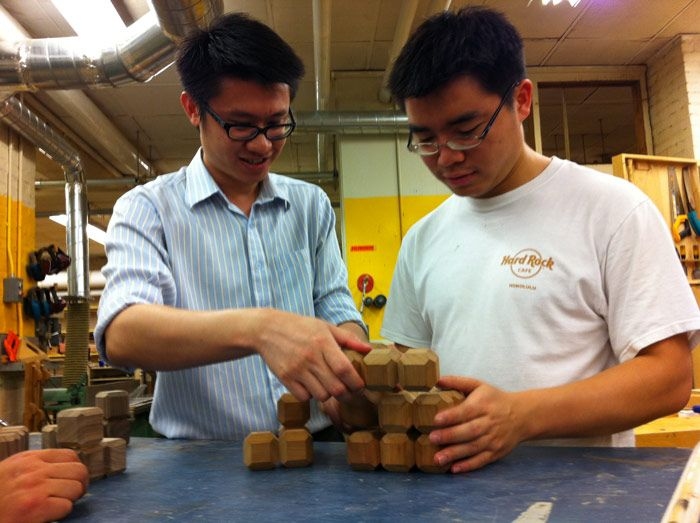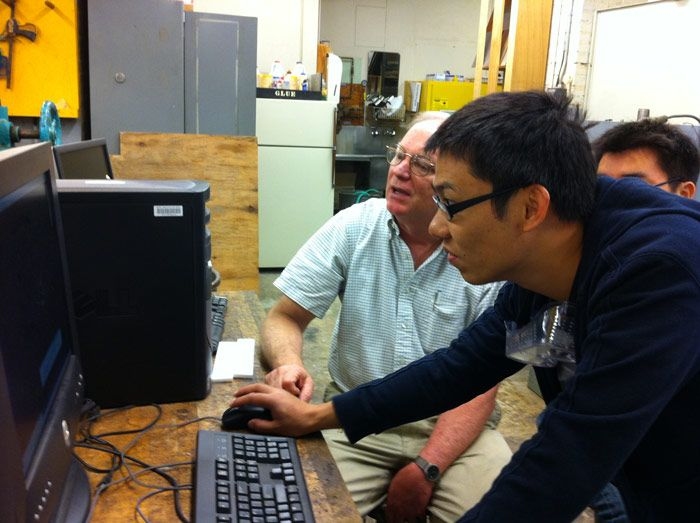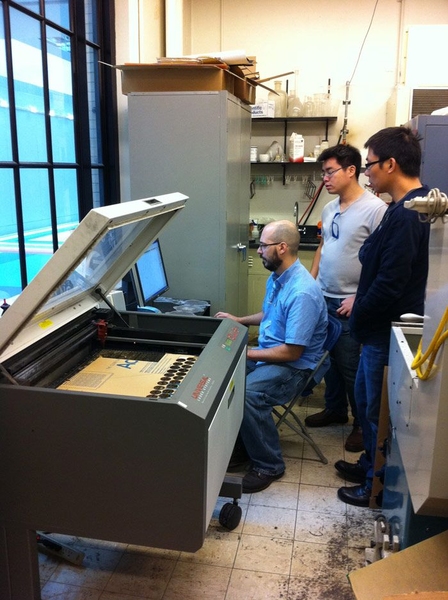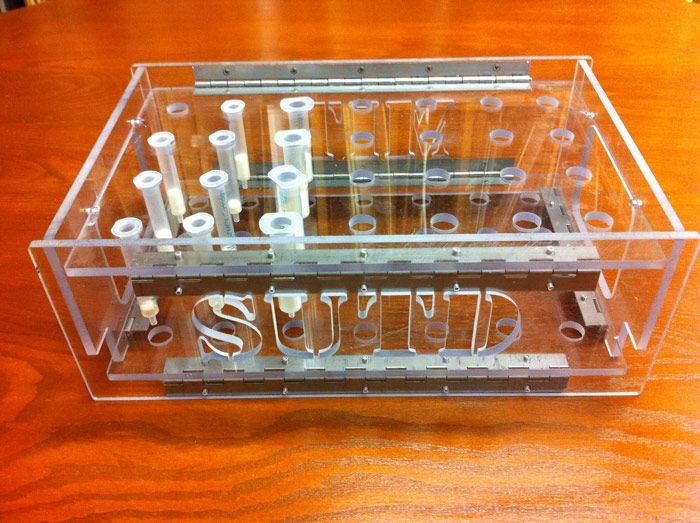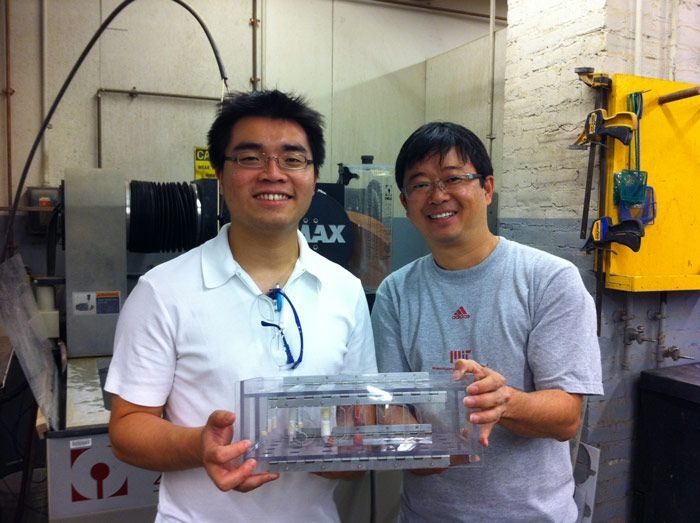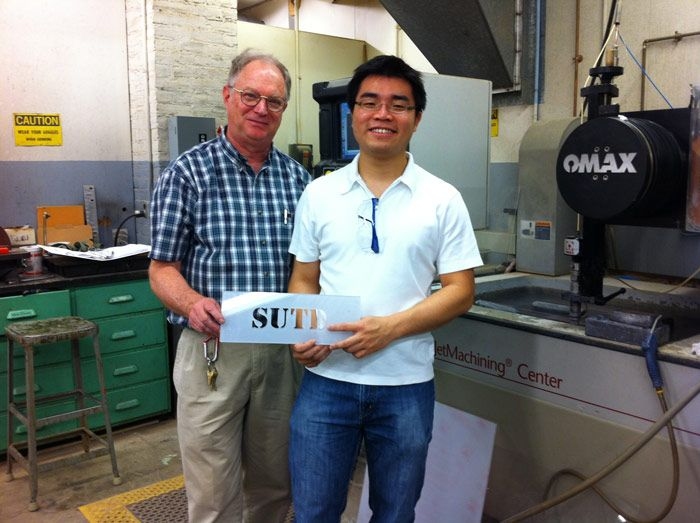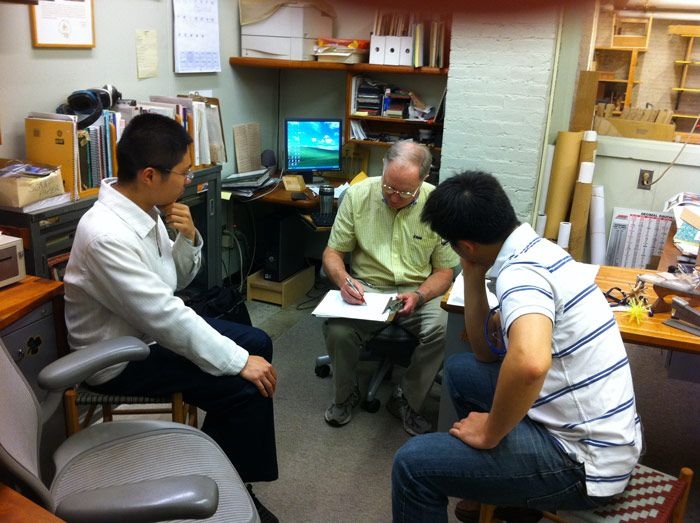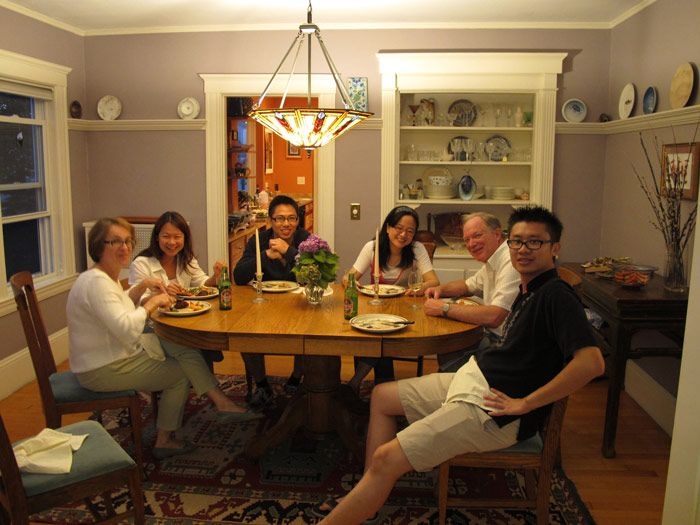In January, MIT formally signed a collaboration agreement with the Singapore University of Technology and Design (SUTD), and as part of the agreement, seven SUTD instructors from various departments recently commanded laser cutters, water jets and other advanced wood- and metalworking equipment in the MIT Hobby Shop to develop building skills, teamwork and an appreciation for a cornerstone of MIT culture.
MIT Hobby Shop Director Ken Stone ’72 guided the SUTD group as part of the “Teach the Teachers” program, in which members of the MIT community instruct SUTD faculty on the building blocks that shape MIT culture. Since January, the visiting instructors have absorbed dozens of MIT educational and cultural experiences that they hope to incorporate into their own teaching at SUTD. Some of the visiting professors nicknamed the process “the drinking of MIT’s DNA.”
Through imbibing MIT culture at the Hobby Shop, the visitors were reminded of the importance of cross-disciplinary collaboration. “It was great to see these colleagues from different fields working together,” Stone said. “It was interesting to watch how instructors with deep knowledge of their own subject areas collaborated when they were thrown together in a project that was nobody’s area of expertise.”
The visitors quickly discovered that their strengths fit together like the wooden puzzles that Stone helped them construct. They called upon their new sense of camaraderie to direct computer software and a water jet to carve “SUTD” into metal sheets.
SUTD Assistant Professor Foong Shaohui designed a collapsible box to contain a water-filtration system, which turned out to be a useful and timely project. Stone guided Foong and Yong as they built a wood prototype and then a plastic demonstration model that holds stackable drip filtration devices. SUTD Assistant Associate Professor Jean Yong plans to bring the box to Indonesia where individual households can implement the system to filter bacteria and other contaminants such as arsenic from their drinking water.
At the conclusion of their Hobby Shop experience, the SUTD instructors raved about the power of collaboration and building from scratch. “My time with Ken reminded me that I need to continue to be a ‘hands-on’ professor," said one participant.
“Much of MIT’s success lies in its model of combining hand and mind,” Stone said. “The Hobby Shop is a non-departmental shop, open to all MIT students, where students actually make things. Bringing idea to reality is quintessential MIT.”
To learn more about the Hobby Shop, visit the Hobby Shop website.
MIT Hobby Shop Director Ken Stone ’72 guided the SUTD group as part of the “Teach the Teachers” program, in which members of the MIT community instruct SUTD faculty on the building blocks that shape MIT culture. Since January, the visiting instructors have absorbed dozens of MIT educational and cultural experiences that they hope to incorporate into their own teaching at SUTD. Some of the visiting professors nicknamed the process “the drinking of MIT’s DNA.”
Through imbibing MIT culture at the Hobby Shop, the visitors were reminded of the importance of cross-disciplinary collaboration. “It was great to see these colleagues from different fields working together,” Stone said. “It was interesting to watch how instructors with deep knowledge of their own subject areas collaborated when they were thrown together in a project that was nobody’s area of expertise.”
The visitors quickly discovered that their strengths fit together like the wooden puzzles that Stone helped them construct. They called upon their new sense of camaraderie to direct computer software and a water jet to carve “SUTD” into metal sheets.
SUTD Assistant Professor Foong Shaohui designed a collapsible box to contain a water-filtration system, which turned out to be a useful and timely project. Stone guided Foong and Yong as they built a wood prototype and then a plastic demonstration model that holds stackable drip filtration devices. SUTD Assistant Associate Professor Jean Yong plans to bring the box to Indonesia where individual households can implement the system to filter bacteria and other contaminants such as arsenic from their drinking water.
At the conclusion of their Hobby Shop experience, the SUTD instructors raved about the power of collaboration and building from scratch. “My time with Ken reminded me that I need to continue to be a ‘hands-on’ professor," said one participant.
“Much of MIT’s success lies in its model of combining hand and mind,” Stone said. “The Hobby Shop is a non-departmental shop, open to all MIT students, where students actually make things. Bringing idea to reality is quintessential MIT.”
To learn more about the Hobby Shop, visit the Hobby Shop website.
